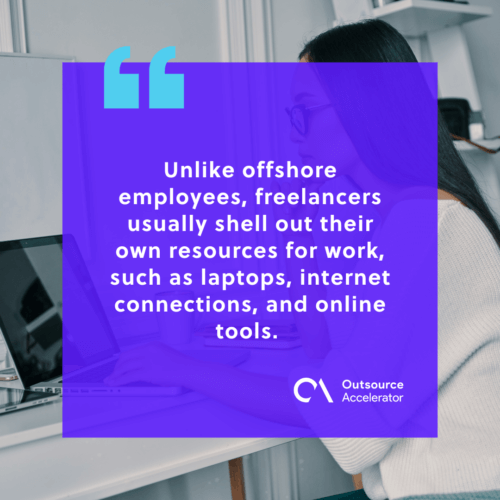The hidden cons of freelancing: Insights from an entrepreneur

Freelancing can somehow bring advantages for employees that look for alternative ways to work. In addition, this gives companies a jumpstart in building a team and delegating their functions.
More companies are taking advantage of hiring freelancers, especially in an impending crisis. Upwork’s 2021 Future Workforce Report found that 71% of companies planned to either sustain or increase their efforts in hiring freelancers in the future.
Yet, despite the bright promise that freelancing has to companies and freelancers, its downsides are hidden underneath. Doxa Talent CRO and co-founder Michael Ross explains this and how Doxa fills the gaps in these issues in episode 399 of the OA podcast.
Why hiring offshore is better than freelancing
Throughout his years as an entrepreneur, Michael realized that outsourcing is “about the nuts and boots of running a business.”
This boils down to workforce management, building a team, and sharing the vision with customers and employees.
Indeed, offshoring is technically setting up a business with the help of a team sitting in another location with a different time zone. While freelancing can be a cheaper way to hire remotely, offshoring provides better solutions for the following reasons.
Infrastructure
Offshore firms usually offer an “all-in” package when building a team. They take care of everything their operations need, from talents to office spaces, equipment, and top-tier infrastructure.
Top talents
Companies that delegate their functions offshore have bigger chances of hiring top talents than freelancing.
Different BPOs and offshore firms have their ways of attracting talent. In the case of Doxa Talent, they find the best ones by “being at the top of the market” while maintaining cost arbitrage for businesses.

Dedication
Most importantly, service providers and their talents are fueled by their long-term commitment to providing high-quality services. Unlike freelancers committed to short-term projects, offshore employees usually prefer stability at work.
For instance, the talents that Doxa attracts are generally looking for “[a company] they can grow with,” making establishing long-term relationships with businesses more achievable.
Hidden cons of freelancing
Michael observed that most people that tried hiring freelancers in the past “and had mixed or horrible results” have equated their experiences to finding professionals offshore.
As mentioned, freelancing has hidden disadvantages for both the workers and employees. Some of them include the following.
Finite deliverables
Per Michael, most of their clients that hired freelancers in the past experienced “[being] on a project basis and finite deliverables.”
Arguably, most workers available through freelance sites such as Upwork and Fiverr are only hired on a project basis. They are not tied up to a single employer; instead, they juggle multiple projects at a time.
This setup could largely affect their performance, the quality of their outputs, and their commitment to their clients.
Actual cost arbitrage
Freelancing could be cheaper than offshore staffing. However, “cheap” does not always translate to the substantial savings they can get.
As mentioned, BPOs like Doxa Talent can still provide up to 70% cost arbitrage by attracting talents that “[look] for a destination employer.” They also take care of everything needed to make their teams work correctly.
Unlike offshore employees, freelancers usually shell out their own resources for work, such as laptops, internet connections, and online tools. With this setup, clients won’t always guarantee that their employees have optimal performance and output.
Issues on compliance and benefits
Lastly, Michael observes that some freelancers “have transitioned from the freelance market to a fully-employed set up” due to issues with benefits and compliance.
The workers themselves shoulder everything needed when they freelance. This includes paying taxes, social services, and even their benefits such as insurance. Unfortunately, not all freelancers can comply with these needs, especially in a country such as the Philippines.

How Doxa Talent bridges the gaps in freelancing
Luckily, Doxa Talent can help avoid the cons of freelancing through their comprehensive solutions. They offer PEO solutions for clients that “want to bring their teams from the ‘gray economy’ into a proper [office] setup.”
Doxa will serve as the employer of record for a company’s freelance team and help them handle the team’s payroll, taxes, and benefits. At the same time, the company can help them in recruiting and hiring additional staff for each role an organization needs.
Per Michael, having these offerings is a “complimentary” in going hand-in-hand with their client needs.
Visit Doxa Talent’s website to learn more about their services. At the same time, listen to episode 399 of the OA podcast today.







 Independent
Independent




